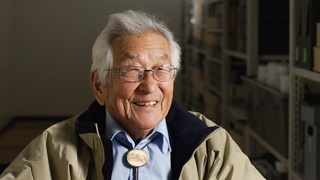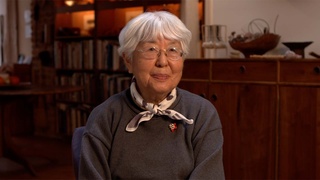Interviews
Prom during the war
I was sophomore when the war broke out. All of the sophomores, we had hardly any social life. Our first junior prom that we had, we were… We had our prom in our cafeteria. We had moved all of our tables off to the side. And the cafeteria there was a very old cafeteria. The floor was very worn, so you know, it wasn’t very smooth—lumps along the lumber there. But we tried to darken the room as best as we can, and that was our junior prom.
I recall our senior prom. We still had curfew, we still had to be off the street by 6 o’clock. And we went to the Mormon Tabernacle on Beretania Street. And we pulled all of the drapes so that it was completely dark and a very dim light. And our senior prom was from 1 o’clock to 3:30.
And so, that’s the kind of social life that we had. We didn’t have very much activities going on. And so a lot of us, our friends that got together and we’d spend time together from one friend's house to another friend's house on weekends. So we developed a closeness among some of the friends that we had in high school.
Date: December 15, 2003
Location: Hawai`i, US
Interviewer: Art Hansen
Contributed by: Watase Media Arts Center, Japanese American National Museum.
Explore More Videos

Joining the army
(1919 - 2015) Nisei who served in World War II with the 442nd Regimental Combat Team

Animosity between the Hawaiians and the mainlanders
(1919 - 2015) Nisei who served in World War II with the 442nd Regimental Combat Team

Being scared during combat
(1919 - 2015) Nisei who served in World War II with the 442nd Regimental Combat Team

Never feared that he wouldn’t come back home
(1919 - 2015) Nisei who served in World War II with the 442nd Regimental Combat Team

On saving the Lost Battalion
(1919 - 2015) Nisei who served in World War II with the 442nd Regimental Combat Team

Coming home to his mother after the war
(1919 - 2015) Nisei who served in World War II with the 442nd Regimental Combat Team

Getting a PhD under the G.I. Bill
(1919 - 2015) Nisei who served in World War II with the 442nd Regimental Combat Team

Feeling at peace with himself
(1919 - 2015) Nisei who served in World War II with the 442nd Regimental Combat Team

Grandfather loved to tell her stories of her great-grandfather Arakaki
Okinawan American whose parents are from Peru.

Prosecution of Japanese Peruvians during the war
Okinawan American whose parents are from Peru.



The Emotional Toll of Being Incarcerated in Camp during World War II
(b. 1932) Nisei American stage, film, and TV actress

Sister’s Trauma from being Incarcerated during World War II
(b. 1932) Nisei American stage, film, and TV actress

FBI agents came to the house while parents were gone
(b. 1923) Japanese American poet, activist
